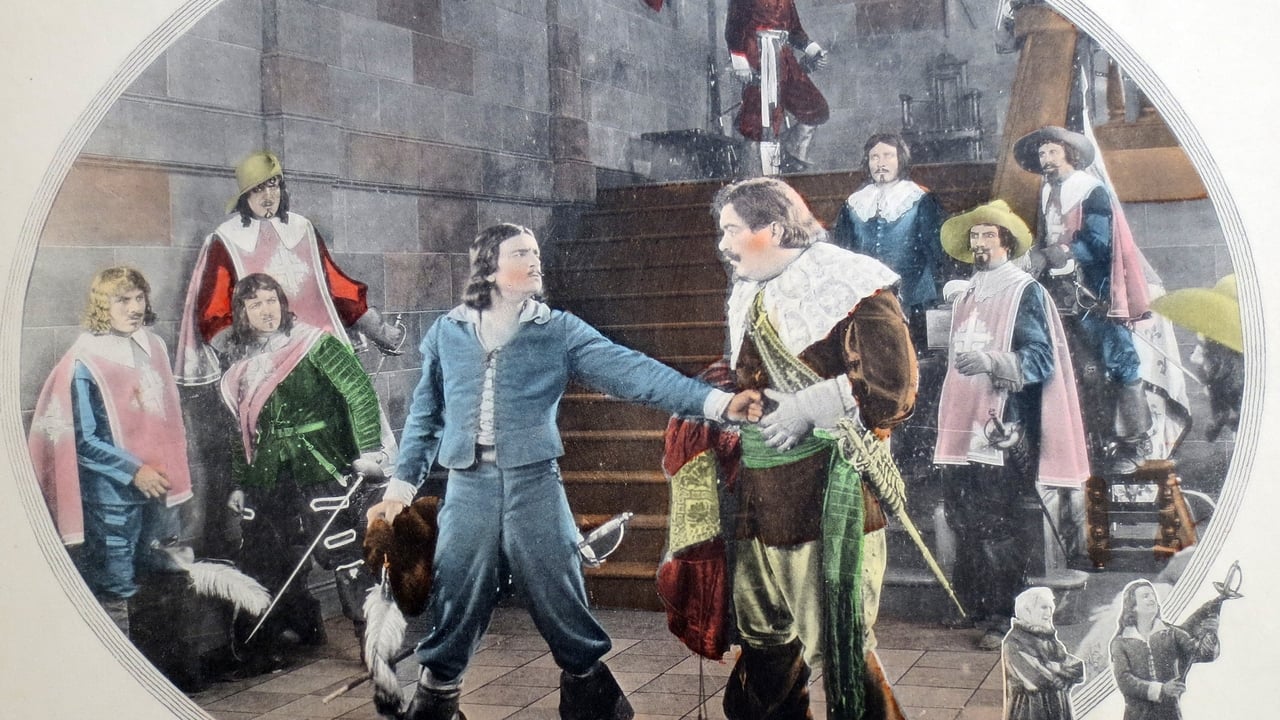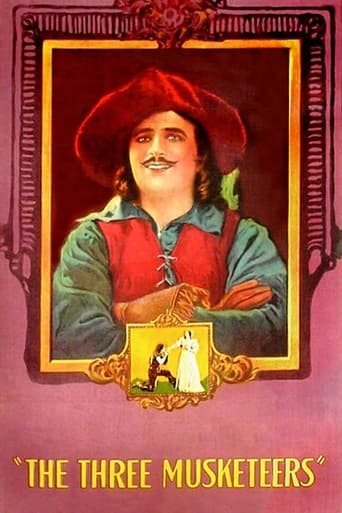



Save your money for something good and enjoyable
Dreadfully Boring
a film so unique, intoxicating and bizarre that it not only demands another viewing, but is also forgivable as a satirical comedy where the jokes eventually take the back seat.
View MoreClose shines in drama with strong language, adult themes.
View MoreAnother great Douglas Fairbanks film, not one of his best but still hugely entertaining. As an adaptation it is rather abridged, the details and spirit are there but there are versions since that have had much more depth to characterisation and such, the musketeers here are still very fun to watch but can feel like window-dressing. However, as a film and a stand alone there is plenty to love. Aside from the abridgements the only real misgiving was the rushed ending. The Three Musketeers though is still beautifully photographed and the costumes and sets equally evocative and lavish. It is wittily written, a lot of chat especially for a silent film but it has the Dumas spirit and none of it feels like irrelevant filler. As well as rousingly scored, there are three scores available one from 1921 and the others from 1996, the most fitting of the three is Louis F. Gottschalk's from 1921. The story is still diverting and goes at a crisp pace, with lots of twists and turns along with a real sense of adventure, excitement and suspense, basically all the ingredients for a great period adventure. The action sequences are highly athletic with lots of exciting bravado, it is edge-of-the-seat stuff with no signs of clumsiness or predictability. Fairbanks is great, he is full of charisma with touches of arrogance, wit and sparkling humour and tackles his stunts with a real effortless ease. Margarite De LaMotte is a touching Constance and Barbara La Marr a sensual and haunting Milady DeWinter. Adolphe Menjou is appropriately cruel and the Musketeers are well-played, but aside from Fairbanks the standout in the acting department was Nigel De Brulier as a sly and malevolent Richelieu. Overall, the 1973 Richard Lester version is still the definitive adaptation of The Three Musketeers but if we're talking about adaptations being judged on their own this is one of the better and most enjoyable ones, apart from the Burbank Films Australia animated version and the updated one from the Asylum I don't think any of the adaptations are really terrible(yes that is including the 1993 film). 9/10 Bethany Cox
View MoreThis is the best Fairbanks costume drama I've seen in terms of his agility, the dialogue, quality of action scenes and acting, and set. He just seemed to have it all together with this one, with his character's physical qualities impressing the King and a surprisingly deft battle of wits with Cardinal Richielieu impressing that dangerous man. It is said Fairbanks was a huge fan of Dumas, and indeed he showed deep enough acquaintance with the original "Three Musketeers" to successfully keep the original feel of the book (particularly the last section) while neatly cleaning it to be acceptable to 1920s morals (the Twenties may have roared, but they weren't yet ready for the Executioner of Lille; the darker side of Milady and Athos; Constance's infidelity and tragic end; the anti-Puritan stereotyping; D'Artagnan's becoming not just the talk of Paris but that city's most popular and busy lover of high-society ladies, including just about everybody but the Queen), and so forth.The original three musketeers did much to keep all that subplot going, and this may be why Fairbanks gives them relatively little to do in the movie. Too, he seems to be focusing on the latter part of the book where D'Artagnan does come to the fore, though if anything, he toned down D'Artagnan's role, too (if you haven't read the book, you're in an over-the-top tour de force, believe me!).Anyway, the physical performances by Fairbanks that stand out here include, of course, the famous left-handed handspring during the duel (in which we learn what happens when the bad guy, not Indiana Jones, brings a gun to a sword fight); the horsemanship Doug displays; the skill shown in the fencing scenes (he had come a long way from "Mark Of Zorro," which was not bad either); and the general agility he shows whether he's leaping into a cupboard or through a window or tiptoeing across the tip of a rooftop with a damsel in distress on his shoulder. Two sword-fights that stand out, besides the duel, are the one in the apothecary's shop, where not a single jar or bottle is broken in spite of the general mayhem going on between D'Artagnan and the Cardinal's best swordsman, and the scene where Fairbanks squares off against Milady (is this the only scene where Douglas Fairbanks fought a woman?).
View MoreImpoverished nobleman Douglas Fairbanks (as D'Artagnan)'s greatest ambition is to join the King's royal swordsmen, "The Three Musketeers". And, after impressing the three best swordsmen in Paris, Mr. Fairbanks becomes their fourth blade. He also finds love, with Marguerite De La Motte (as Constance), and much palace intrigue. Nigel de Brulier (as Cardinal Richelieu) makes life particularly irksome, involving Fairbanks and friends in schemes against weak a King Adolphe Menjou (as Louis XIII), and his unfaithful Queen Mary MacLaren (as Anne).Alexandre Dumas' classic is a perfect vehicle for Fairbanks; who, after the success of his "Zorro", struck box office gold with a series of classy audience pleasing productions. While this is not the best "Musketeers" movie, it's certainly true that Fairbanks' 1920s films had an indelible impact upon subsequent adaptations. Fairbanks, through the force of his personality, didn't so much "play" characters like "D'Artagnan" as much as he made the characters play him.Fred Niblo (director) and Arthur Edeson (photographer) create a great swashbuckling atmosphere. Nigel de Brulier steals the acting honors, with his cunning, cat-stroking "Richelieu"; the best supporting player will reprise his role in a trio of additional "Musketeers" films, including the superior Fairbanks sequel "The Iron Mask" (1929). Pretty "leading lady" De La Motte (from "Zorro") and others will also return. After all, it is... "All for one and one for all." ******* The Three Musketeers (8/28/21) Fred Niblo ~ Douglas Fairbanks, Nigel de Brulier, Marguerite De La Motte
View MoreAfter admiring Douglas Fairbank's smashing looks in the later THIEF OF BAGDAD, I have to say he looks extremely unattractive in these pseudo-historical French costumes and a wig you wonder where he got it from. And not only does he as the star attraction look bad - the French queen (for one) is just as terrible with an equally terrible wig. Not to mention the Three Musketeers: stout, unsporty, unfunny. I wonder if in 1921 this was considered 'attractive'? (I very much doubt it.) Still, some of the scenes are fun to watch, even at epic length (more than two hours running time.) I guess with the right symphonic live music it must have been impressive back then. With cheap (and thin sounding) computer music as a soundtrack on DVD today, it is... a bit dreary. (Sadly.)Interstingly, there is a 1929 stage operetta of the same title by Benatzky/Charell created for Berlin (and recently revived in Nordhausen, Germany), that makes interesing comparison with this film - whole scenes have been taken 1:1 from it. Only with better music attached to it. It would be fun to see the film with a Benatzky-based soundtrack!
View More